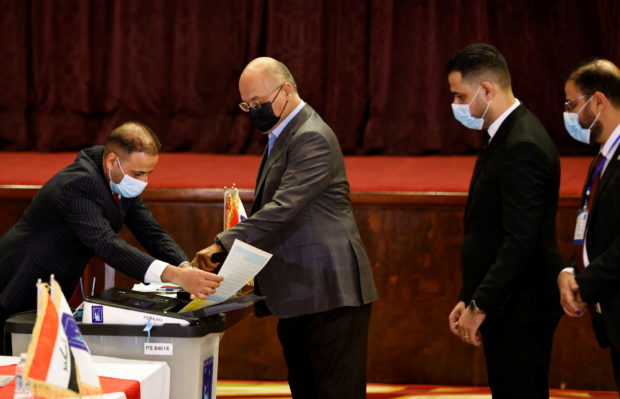Iraqis vote in general election, a test for democratic system

Iraq’s President Barham Salih casts his vote at a polling station in Baghdad, as Iraqis go to the polls to vote in the parliamentary election, in Iraq, October 10, 2021. REUTERS
BAGHDAD — Iraqis were voting on Sunday in a general election many said they would boycott, having lost faith in the democratic system brought in by the U.S. invasion of 2003.
The election is being held several months early under a new law designed to help independent candidates – a response to mass anti-government protests two years ago. But the established, armed and Shi’ite Islamist-dominated ruling elite is expected to sweep the vote.
The result will not dramatically alter the balance of power in the country or the wider Middle East, say Iraqi officials, foreign diplomats and analysts.
The United States, Gulf Arab countries and Israel on one side and Iran on the other compete for influence in Iraq, which has provided a gateway for Tehran to support militia proxies in Syria and Lebanon.
At least 167 parties and more than 3,200 candidates are competing for Iraq’s 329 seats in parliament, according to the country’s election commission.
Article continues after this advertisementIraqi elections are often followed by months of protracted negotiations over a president, a prime minister and a cabinet.
Article continues after this advertisementWashington is removing all U.S. combat troops from Iraq as part of an agreement with the Iraqi government, although the move keeps most of its 2,500 troops in the country in non-combat roles, according to U.S. officials.
The decision to draw down troop levels came under pressure from Iraq’s dominant Shi’ite parties, many of them backed by Iran, which called for the removal of U.S. forces after the U.S. killing of Iran’s top military commander, Qassem Soleimani, in Baghdad in 2020.
The populist Shi’ite cleric Moqtada al-Sadr, who opposes all foreign influence and is a rival of the Iran-aligned Shi’ite groups, is expected to come first in the election. He has also called for foreign troops to withdraw.
Prime Minister Mustafa al-Kadhimi, widely viewed as Western-friendly, cast his ballot as soon as polls opened. “I call on Iraq people: there’s still time. Go out and vote for Iraq and vote for your future,” he said to news cameras.
Kadhimi’s government called the vote several months early in response to the demands of anti-establishment protests in 2019 that toppled the previous administration.
Protesters demanded jobs, basic services and the removal of a ruling elite most Iraqis view as corrupt and keeping the country in disrepair, despite several years of relative security following the 2017 defeat of Islamic State.
The demonstrations were brutally suppressed by security forces and militia groups, killing some 600 people over several months.
Early vote, new law
Officials say a new voting law, also a response to protester demands, will help independent, pro-reform candidates, but that will depend on turnout.
Many Iraqis say they will boycott the vote. They view the democratic system ushered in after the U.S. invasion as flawed and serving only the political parties that have dominated the state since then.
The invasion toppled Sunni Muslim dictator Saddam Hussein and catapulted to power the country’s majority Shi’ites and the Kurds, who were oppressed under Saddam. It unleashed years of brutal sectarian violence from which Iraq is still recovering, including the takeover of a third of the country by the Sunni extremist Islamic State between 2014 and 2017.
The biggest Shi’ite blocs in Sunday’s election – Iraq’s fifth parliamentary vote since 2003 – are those of Sadr and a separate coalition of Iran-aligned parties with armed wings.
Kurds have two main parties that rule the autonomous Kurdistan region of Iraq, and Sunnis this time have two main blocs.
Once results are ratified, President Barham Salih has 15 days to task parliament with convening to choose a speaker. Parliament must then also choose a president within 30 days.
The largest bloc in parliament then names a prime minister to form a government. The whole process can take months to complete while rival coalitions jockey over power and posts.